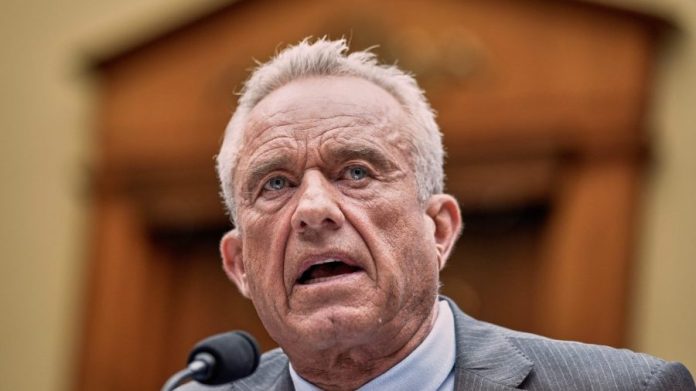
Secretary of Health and Human Services Robert F. Kennedy Jr. has pulled the plug on funding for GAVI, the global vaccine alliance. Every government needs to choose how to spend its own taxpayer money, of course, and the U.S. is far from the only country cutting back on aid. But childhood immunization is actually one of the best ways to make the world stronger and more stable.
Kennedy announced his decision in a confrontational video addressed to GAVI’s Brussels summit in June, citing baseless claims about vaccine safety. Kennedy is wrong. Childhood vaccines have been a triumph for human welfare. A retrospective Lancet study last year found they have likely saved 154 million lives globally over the past 50 years, with 94 million saved from measles vaccinations alone.
For most of humanity’s time on this planet, nearly half of our children have not survived to adulthood. Just two centuries ago, infectious diseases accounted for nearly half of all deaths in rich nations like the U.S. and Britain. Vaccines first managed and later eradicated smallpox — a disease that killed between 300 and 500 million people in the 20th century alone. Vaccines ended the scourge of polio — which, even in 1950, killed or paralyzed over half a million people every year. And vaccines eliminated measles in the U.S. by the year 2000, when just a century before American children suffered hundreds of thousands of infections and nearly 10,000 deaths each year.
By preventing killer diseases, vaccines have transformed lives in America. They have saved untold heartbreak, and reduced the strain on health systems, freeing resources to tackle chronic conditions such as heart disease and cancer.
Naturally, we should all want children in the rest of the world to have the same chances of surviving against easily preventable diseases. Unfortunately, poor countries have extremely limited budgets, with less than $90 per person per year available for all public spending. Even a minimal baseline health care system would consume the entire budget, and governments also have to spend on education, infrastructure, social protection, defense, public order and debt service. Here, kindness from rich countries like America is crucial to preventing deaths and thereby fostering growth and stability.
Before Kennedy’s decision, the U.S. was paying 13 percent of GAVI’s costs. Other significant funders include Norway, Germany and the Gates Foundation. Altogether, more than 40 sovereign and philanthropic donors are taking their share of the responsibility to help the world’s poorest. The U.S. contribution of $400 million per year can help a lot, vaccinating 75 million additional children and preventing more than 1.2 million deaths in the next five years.
Since 2000, the global health partnership has vaccinated 1 billion children across 78 countries, saving 19 million lives. GAVI’s work has been pivotal in halving child mortality in supported regions since 2000 through vaccines like DTPw, which protects against diphtheria, tetanus and pertussis.
Between 2026 and 2030, GAVI aims to immunize at least 500 million more children, potentially preventing an additional 8 to 9 million deaths. This will not only save heartache for parents and families, but it will boost economic security. Illness and death from infectious disease can wreak economic devastation that families struggle to recover from.
Research from my think tank, Copenhagen Consensus, quantifies the extraordinary value of vaccine investments. Maintaining current global spending will save 3.8 million lives annually from preventable diseases by 2030, delivering an almost unimaginable $286 in social benefits for every dollar spent. This is an incredible opportunity to help share the moral responsibility for humanity and do good in the world.
But we should not stop there. Scaling up vaccination coverage, though costlier at $1.5 billion annually plus $200 million in indirect costs (like time spent by families accessing clinics), would save an additional 4.1 million lives yearly. This translates to $101 in social benefits per dollar spent, still an unparalleled return on investment.
Kennedy bases his attack on GAVI on vaccine safety. This is unfounded scaremongering. There is more than a century of evidence of vaccine effectiveness, with billions of people vaccinated. Vaccines have been monitored for safety since their introduction in the U.S., with formal regulatory structures established in the early 20th century. The latest public U.S. study from the Agency for Healthcare Research and Quality, of over 300 studies in 500 publications, found no evidence of major safety concerns connected to the childhood immunization schedule.
While nothing is ever totally safe, and rare adverse effects are possible, such a tiny downside completely pales next to the upside of protecting the lives of almost 4 million children that the vaccines now save every year.
Instead, Kennedy’s attack contributes to vaccine hesitancy in rich countries, where vaccination rates were already dropping. This has real consequences — American measles cases are now at a 33-year high. It is easy to make parents scared, but giving them the full picture would highlight the enormous overall upside of well-tested childhood vaccines.
Vaccines have become a new battleground of the culture wars. They shouldn’t be. Yes, we should always be clear about safety, but we should also always keep in mind the much greater benefits.
America has always been a generous country. It has been a beacon of common sense. Kennedy’s approach is wrong. Reversing this decision would avoid squandering decades of U.S. soft power.
Congress should undo this. The lives of millions of children worldwide hang in the balance.
Bjorn Lomborg is president of the Copenhagen Consensus, a visiting fellow at Stanford University’s Hoover Institution and author of the book “Best Things First.”

